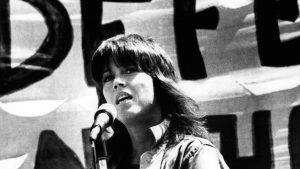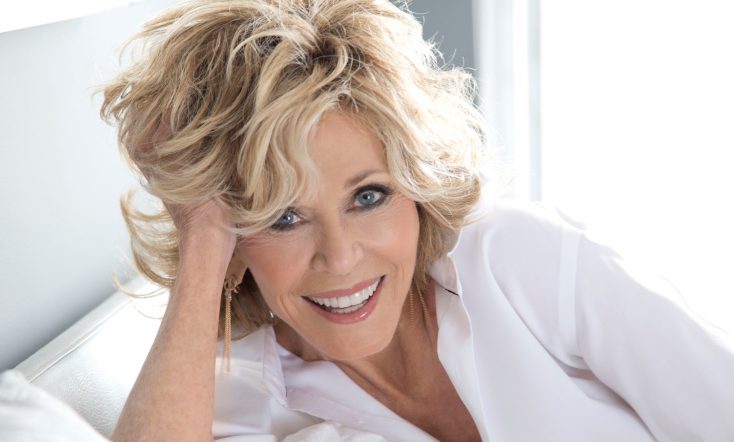
Jane Fonda speaking at an anti war rally in San Francisco, 8/24/72. Featured in JANE FONDA IN FIVE ACTS. ©Everett Collection. Courtesy of HBO.
By JUDY SLOANE
Front Row Features
HOLLYWOOD—In her 80-plus years on this planet, Jane Fonda has lived many lives—ingenue, sex symbol (“Barbarella”), Oscar winner (for her performances in “Coming Home” and “Klute”), fitness guru and activist, being labeled “Hanoi Jane” when she visited communist North Vietnam during the Vietnam War.
Susan Lacy’s documentary “Jane Fonda in Five Acts,” covers it all, drawing on 21 hours of interviews with the actress. It also features interviews with her ex-husbands Ted Turner and Tom Hayden, as well as her co-stars Robert Redford and Lily Tomlin. The special includes her busy life today, which she describes as “the beginning of my last act.”
Fonda came to the TV Critics tour to discuss her life, her career and a regret that still haunts her.
The documentary premieres on HBO Monday, Sept. 24 at 8 p.m. ET/PT.
Q: Why did you want to do this documentary? I understand wanting to reconcile our lives as we grow older, but why did you want to share it with the public?
Fonda: Susan (Lacy) asked me to it, and I very much admire Susan as a documentary filmmaker, and (because of my autobiography), which has been translated into 17 languages. I still get letters and e-mails from people all the time who have just read my book and it had a big impact on people.
What surprised me is it had an impact on men as well as women. Oddly enough, a lot of people identify with the various struggles that I’ve had. Issues with parents, issues with eating disorders, issues with men, issues with self-confidence, and so I felt that if these things could be brought to a broader audience, that it would be informative and helpful to other people, and that I was in good hands. A lot of people have asked to do documentaries about me for a long time but I wanted to work with Susan, for HBO, so I said yes.
Q: Director Alan Pakula says in the film that you were a strong woman, but you spent so much time around men who tended to be controlling.
Fonda: I don’t know. I didn’t have very much confidence, and I thought that if I was with those kinds of men that I could be somebody. They were all so brilliant and they could teach me things and take me farther than I had ever gone. They weren’t boring.
Q: Were you aware of the Nixon tapes about you?
Fonda: Oh yeah, I wrote a memoir and I went to the (U.S.) Archives. I knew what Nixon had said and I knew what the FBI said. I knew what the Treasury people had said about me. I know that the guy that was assigned in the Justice Department to find causes for indicting me for treason he said, “She didn’t commit treason. She was just trying to get the soldiers to think.” I saw all of that in the tape so I knew it.
I never thought (Susan) was going to use that to open the film. When I saw it, I couldn’t stop laughing. I thought it was just brilliant.
Q: Early on in your career when you were an ingenue. What women did you work with in Hollywood that instilled confidence in you?
Fonda: The woman that had the biggest effect on me was Katharine Hepburn in “On Golden Pond,” which I also produced. That was really the first time that I can honestly say a woman that I worked with had a lifelong impact on me.
Q: When do you think you started living up to your own potential?
Fonda: It’s maybe beginning now. I think I’m maybe just starting now to do that.
Q: What took you so long?
Fonda: I’m a late bloomer, but you know, we live 34 years longer than we used to, so it’s not so bad being a late bloomer. There’s certain advantages.
Q: What was it like to watch the documentary when it was complete?
Fonda: It’s very hard for me to watch it, actually. It’s not easy, in a time like this, to talk about myself so much. I find it a little bit awkward.
Q: Do you see it as a testament of your life and career?
Fonda: Sometimes I think I wish I could do it over, because there are things that I would say differently now. I don’t know if it’s a testament. It’s a documentary about me, and it would be a little different if we did it now. It ended what, a year or two ago? So much as changed.
Q: Did you expect to hear what everyone said about you in the documentary?
Fonda: I didn’t expect my son (Troy Garrity) to say those things. He was so beautiful. And my step-daughter Natalie, it touched me so much when she said Jane has a way of when she’s focused she’s completely there and when she moves on, she forgets about it. That was hard for me to hear.
Q: As you look back in this documentary and your life, what is the biggest change that had the most significance on you?
Fonda: The Vietnam War.
Q: In what way?
Fonda: I would say that prior to my becoming an anti-war activist, I had lived an eventful life, an interesting life, but a meaningless life. I was a kind of a pretty girl who made movies and kind of hedonistic. And so, when I decided to throw in my lot with the anti-war movement, everything shifted. Everything. The way I looked at the world and other people, the people I was drawn to, what interested me, everything changed. That was the big change.
Q: What made you decide that you were going to get involved in it?
Fonda: I had met American soldiers in Paris and they told me what they had seen and done in Vietnam and they gave me a book to read by Jonathan Schell called the “The Village of Ben Suc.”
Prior to that experience, I had been completely uninvolved with anything. I didn’t even know where Vietnam was. After reading that book and talking to these men, the coin shifted and I said, “I feel betrayed by this country’s leadership. We’ve been lied to and I want to do whatever I can to expose that.”
As it says in the documentary, when I grew up, my father was in World War II. I was so proud of that. He was so proud of that. I really thought that if we had men fighting, they were on the side of the angels and I didn’t like it when people in France who knew better than I did and who had already been fighting and lost the war in Vietnam when Vietnam was fighting for independence from colonialism.
So, I believed if we were there it was for a good reason. It’s kind of like the more you believe in something, if you find out that it’s totally not true, then you become a very staunch advocate on the other side. We had to end that war and I decided I would do everything I could in my power to stop it, not individually but as part of a movement.
Q: When soldiers that fought in Vietnam come up to you today and engage you in conversation, are they positive?
Fonda: Sometimes. Not always. I like it when they come to me and it’s not positive because it’s an opportunity to talk. And you have to do that with a very open mind and a soft heart and be forgiving and understanding. So, I welcome those opportunities a lot.
Q: But there’s so many that didn’t want to go there and knew the truth, and were on your side. Does that make you feel good?
Fonda: Oh, it does. It makes me feel good. And the ones who aren’t coming from where you’re coming from, it makes me know that they still, after all this time, haven’t learned the nature of the war and why we fought it. And that’s sad. I’m proud that I went to Vietnam when I did, and I’m proud that the bombing of the dikes stopped.
But what I say in the film is true. I’m so sorry that I was thoughtless enough to sit down on that gun (in North Vietnam) at that time, and the image and message that that sends to the guys who were there and their families. It’s just horrible for me to think about that.
Q: Could you discuss the contrast within your father. He was an actor who always portrayed the common man and stood up for the common man, but yet, he said to you, “There better not be any **** communists coming into this house.” Did you ever have any success in explaining to him what you were doing, and that that was the same things he really believed in too?
Fonda: Dad was coming from a place of someone who saw his friends’ careers and lives destroyed because of McCarthyism, and that’s why he was afraid. He was afraid that there would be a resurgence of McCarthyism that would take me down. I never really did have that kind of conversation with him that you’re asking about. I wish I had. But we came together as people who loved each other at the end. Yeah, I feel him with me.





